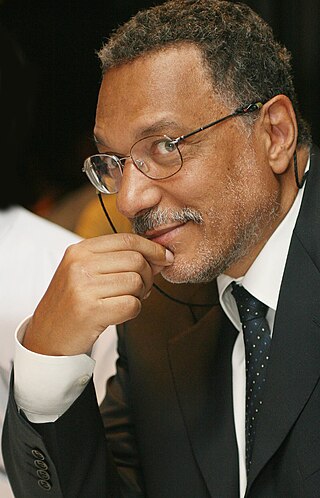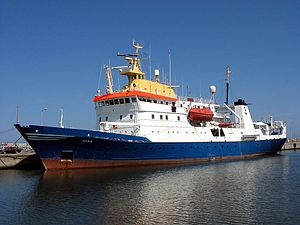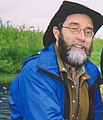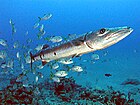
FishBase is a global species database of fish species. It is the largest and most extensively accessed online database on adult finfish on the web. Over time it has "evolved into a dynamic and versatile ecological tool" that is widely cited in scholarly publications.

Fishery can mean either the enterprise of raising or harvesting fish and other aquatic life or, more commonly, the site where such enterprise takes place. Commercial fisheries include wild fisheries and fish farms, both in freshwater waterbodies and the oceans. About 500 million people worldwide are economically dependent on fisheries. 171 million tonnes of fish were produced in 2016, but overfishing is an increasing problem, causing declines in some populations.
Bioeconomics is closely related to the early development of theories in fisheries economics, initially in the mid-1950s by Canadian economists Scott Gordon and Anthony Scott (1955). Their ideas used recent achievements in biological fisheries modelling, primarily the works by Schaefer in 1954 and 1957 on establishing a formal relationship between fishing activities and biological growth through mathematical modelling confirmed by empirical studies, and also relates itself to ecology and the environment and resource protection.

A conventional idea of a sustainable fishery is that it is one that is harvested at a sustainable rate, where the fish population does not decline over time because of fishing practices. Sustainability in fisheries combines theoretical disciplines, such as the population dynamics of fisheries, with practical strategies, such as avoiding overfishing through techniques such as individual fishing quotas, curtailing destructive and illegal fishing practices by lobbying for appropriate law and policy, setting up protected areas, restoring collapsed fisheries, incorporating all externalities involved in harvesting marine ecosystems into fishery economics, educating stakeholders and the wider public, and developing independent certification programs.

The goal of fisheries management is to produce sustainable biological, environmental and socioeconomic benefits from renewable aquatic resources. Wild fisheries are classified as renewable when the organisms of interest produce an annual biological surplus that with judicious management can be harvested without reducing future productivity. Fishery management employs activities that protect fishery resources so sustainable exploitation is possible, drawing on fisheries science and possibly including the precautionary principle.

Daniel Pauly is a French-born marine biologist, well known for his work in studying human impacts on global fisheries and in 2020 was the most cited fisheries scientist in the world. He is a professor and the project leader of the Sea Around Us Project at the Institute for the Oceans and Fisheries at the University of British Columbia. He also served as Director of the UBC Fisheries Centre from November 2003 to October 2008.
The Centre for Environment, Fisheries and Aquaculture Science (Cefas) is an executive agency of the United Kingdom government Department for Environment, Food and Rural Affairs (Defra). It carries out a wide range of research, advisory, consultancy, monitoring and training activities for a large number of customers around the world.

The environmental impact of fishing includes issues such as the availability of fish, overfishing, fisheries, and fisheries management; as well as the impact of industrial fishing on other elements of the environment, such as bycatch. These issues are part of marine conservation, and are addressed in fisheries science programs. According to a 2019 FAO report, global production of fish, crustaceans, molluscs and other aquatic animals has continued to grow and reached 172.6 million tonnes in 2017, with an increase of 4.1 percent compared with 2016. There is a growing gap between the supply of fish and demand, due in part to world population growth.
The hickory shad, fall herring, mattowacca, freshwater taylor or bonejack is a member of the family Alosidae, ranging along the East Coast of the United States from Florida to the Gulf of Maine. It is an anadromous fish species, meaning that it spawns in freshwater portions of rivers, but spends most of its life at sea. It is subject to fishing, both historic and current, but it is often confused with or simply grouped together with American shad in catch statistics.

A fishery is an area with an associated fish or aquatic population which is harvested for its commercial or recreational value. Fisheries can be wild or farmed. Population dynamics describes the ways in which a given population grows and shrinks over time, as controlled by birth, death, and migration. It is the basis for understanding changing fishery patterns and issues such as habitat destruction, predation and optimal harvesting rates. The population dynamics of fisheries is used by fisheries scientists to determine sustainable yields.
David Henry Cushing FRS (1920-2008) was an English born fisheries biologist, who is credited with the development the match/mismatch hypothesis as an explanation for reduced fish stocks as associated with climatic variability. David Cushing was the first to demonstrate what we now know as "recruitment overfishing" through his work on the collapse of the North Sea herring.
Carl Walters is an American-born Canadian biologist known for his work involving fisheries stock assessments, the adaptive management concept, and ecosystem modeling. Walters has been a professor of Zoology and Fisheries at the University of British Columbia since 1969. He is one of the main developers of the ecological modelling software Ecopath. His most recent work focuses on how to adjust human behaviors in environments that are full of uncertainty. He is a recent recipient of the Volvo Environment Prize (2006). In 2019, Dr. Walters became a Member of the Order of British Columbia.
Tony J Pitcher is a fisheries scientist, well known for his work on the impacts of fishing, the management appraisal of fisheries, and how shoaling behaviour impacts fisheries.

Ray Hilborn is a marine biologist and fisheries scientist, known for his work on conservation and natural resource management in the context of fisheries. He is currently professor of aquatic and fishery science at the University of Washington. He focuses on conservation, natural resource management, fisheries stock assessment and risk analysis, and advises several international fisheries commissions and agencies.

Rainer Froese is a senior scientist at the Helmholtz Center for Ocean Research (GEOMAR) in Kiel, formerly the Leibniz Institute of Marine Sciences (IFM-GEOMAR), and a Pew Fellow in Marine Conservation. He obtained an MSc in Biology in 1985 at the University of Kiel and a PhD in Biology in 1990 from the University of Hamburg. Early in his career, he worked at the Institute of Marine Sciences on computer-aided identification systems and the life strategies of fish larvae. His current research interests include fish information systems, marine biodiversity, marine biogeography, and the population dynamics of fisheries and large marine ecosystems.
Raymond (Ray) John Heaphy Beverton CBE FRS was an important founder of fisheries science. He is best known for the book On the Dynamics of Exploited Fish Populations (1957) which he wrote with Sidney Holt. The book is a cornerstone of modern fisheries science and remains much used today. Beverton's life and achievements are described in detail in several obituaries written by prominent figures in fisheries science.
Sidney J. Holt was a British biologist who was a founder of fisheries science. He was best known for the book On the Dynamics of Exploited Fish Populations which he published with Ray Beverton in 1957. The book is a cornerstone of modern fisheries science and remains much used today. Holt served with the FAO in 1953 and with other UN agencies for another 25 years. After his retirement in 1979, Holt remained active in work related to the International Whaling Commission and conservation of whales in general, also publishing his views about whaling and fisheries management in academic journals.
Frederick Ernest Joseph Fry was a Canadian ichthyologist and aquatic ecologist. He is known for his early research in physiological ecology and population dynamics in fishes. In the late 1940s, he became the first scientist to model how environmental factors affect the activity of fish. He was a 1959 Guggenheim Fellow, and served as president of several organizations including the American Society of Limnology and Oceanography (1951) American Fisheries Society (1966) and American Institute of Fishery Research Biologists (1972).
The American Fisheries Society, is the "world’s oldest and largest organization dedicated to strengthening the fisheries profession, advancing fisheries science, and conserving fisheries resources." It is a member-driven 501(c)(3) nonprofit organization governed by an executive director, a governing board, and officers who are guided by the AFS's organizational documents, a constitution, and a set of rules. Their stated mission is "to improve the conservation and sustainability of fishery resources and aquatic ecosystems by advancing fisheries and aquatic science and promoting the development of fisheries professionals." AFS publishes five peer-reviewed fish journals, books, and the magazine Fisheries, organizes seminars and workshops that promote scientific research and fisheries management, and encourages fisheries education through 58 university-based student subunits. AFS has 48 chapters comprising four geographic regions in North America — North Central, Northeastern, Southern, and Western — and includes two "bi‐national" chapters and a Mexico chapter.

The Beverton Medal is a prestigious. international fish biology and/or fisheries science prize awarded annually. It is awarded to a distinguished scientist for a lifelong contribution to all aspects of the study of fish biology and/or fisheries science, with a focus on ground-breaking research. The medal was established as the highest award of the Fisheries Society of the British Isles (FSBI) to recognize distinction in the field of fish biology and fisheries science, to raise the profile of the discipline and of the Society in the wider scientific community. Medals are awarded to individuals who have made an outstanding contribution to fish biology and/or fisheries. The Beverton Medal is traditionally awarded in July at the Fisheries Society of the British Isles annual international conference.


















